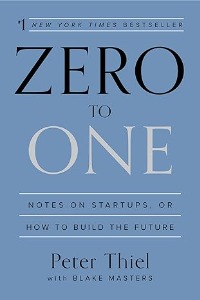Zero to One: The Book That Defied Stagnation and Became a Bestseller
Explore how 'Zero to One' by Peter Thiel and Blake Masters challenges conventional wisdom in the startup world, advocating for unique innovation over incremental progress. Discover key insights, including the value of monopolies, proprietary technology, and independent thinking, and understand why this book became a #1 New York Times bestseller.
Table of Contents
Zero to One: The Book That Defied Stagnation and Became a Bestseller
Introduction
When we think of game-changing books in the realm of startups and entrepreneurship, one title inevitably rises to the top: "Zero to One: Notes on Startups, or How to Build the Future" by Peter Thiel. From its powerful endorsements by industry titans like Mark Zuckerberg and Elon Musk to its transformative ideas on innovation and business, this book has captivated and inspired millions. But what is it about "Zero to One" that makes it a #1 New York Times bestseller? And why should aspiring entrepreneurs and seasoned professionals alike pay close attention to its teachings?
The Genesis of "Zero to One"
Peter Thiel is no stranger to the world of startups. As a co-founder of PayPal and an early investor in Facebook, Thiel has a proven track record of identifying and nurturing breakthrough companies. His co-author, Blake Masters, also brings a wealth of experience from the tech world. Together, they have distilled their insights into a concise, compelling guide that challenges conventional wisdom.
"Zero to One" originated from a series of lectures Thiel gave at Stanford University in 2012. Masters attended these lectures and took meticulous notes, which eventually formed the basis of the book. This origin story alone is a testament to the authenticity and depth of the knowledge contained within its pages.
Breaking Down the Core Message
At its heart, "Zero to One" is built around a contrarian premise: we live in an age of technological stagnation, despite the rapid advancements in information technology. Thiel argues that true progress is not about incremental improvements (going from 1 to n) but about creating entirely new paradigms (going from 0 to 1). This idea resonates deeply with anyone who has ever felt the urge to break free from the status quo and build something truly unique.
Key Highlights:
-
The Value of Monopoly:
- Thiel posits that all successful companies are monopolies in some form, solving unique problems that set them apart from competitors. This is a stark contrast to the traditional belief in perfect competition.
-
Proprietary Technology:
- For a company to achieve a monopolistic advantage, its technology must be at least ten times better than its closest substitute. This is a bold but essential benchmark for any aspiring entrepreneur.
-
Avoiding Competition:
- One of the most counterintuitive yet powerful ideas in the book is the notion of avoiding competition. Thiel advises startups to target small, niche markets where they can dominate before expanding.
-
Thinking for Yourself:
- Perhaps the most contrarian idea of all is the emphasis on independent thinking. Thiel encourages readers to challenge conventional wisdom and think for themselves, a skill that is increasingly rare in today's world.
The Impact and Reception
"Zero to One" has received rave reviews from some of the most influential figures in the business world. Mark Zuckerberg describes it as delivering "completely new and refreshing ideas on how to create value in the world." Elon Musk notes that Thiel has built multiple breakthrough companies and that the book shows how. The Economist praises it as a thoughtful alternative to the pervasive gloom about the world's prospects.
Beyond these endorsements, the book's crisp, rational, and practical writing style makes it accessible to a broad audience. It's not just for aspiring entrepreneurs; anyone interested in innovation and progress can glean valuable insights from its pages.
Why "Zero to One" Became a Bestseller
1. Timeliness:
- The book's release coincided with a period of growing interest in startups and technological innovation. It tapped into the zeitgeist, offering a fresh perspective at a time when many were seeking new ways to think about business and progress.
2. Authority:
- Peter Thiel's credentials and successful track record lent significant credibility to the book. Readers were eager to learn from someone who had "been there and done that."
3. Practical Wisdom:
- Unlike many business books that offer abstract theories, "Zero to One" provides concrete, actionable advice. Its aphorisms and clear prose make it easy to digest and apply.
4. Contrarian Ideas:
- The book's willingness to challenge conventional wisdom and present bold, contrarian ideas made it stand out. It encouraged readers to think differently and inspired a new wave of entrepreneurs.
Conclusion
"Zero to One" is more than just a business book; it's a manifesto for anyone looking to create something new and transformative. Its success as a bestseller is a testament to its powerful ideas, practical wisdom, and the credibility of its authors. Whether you're an aspiring entrepreneur or a seasoned professional, "Zero to One" offers invaluable insights that can help you think differently, avoid competition, and build the future.
If you haven't read it yet, you're missing out on a treasure trove of knowledge that could very well be the key to your next big breakthrough. So go ahead, pick up a copy, and start your journey from zero to one.
Get your copy of "Zero to One" here.
Feel free to leave your thoughts and comments below. Have you read "Zero to One"? What were your biggest takeaways? Let's discuss!
Story updated onSeptember 4, 2024
Table of Contents

Zero to One: Notes on Startups, or How to Build the Future
Peter Thiel